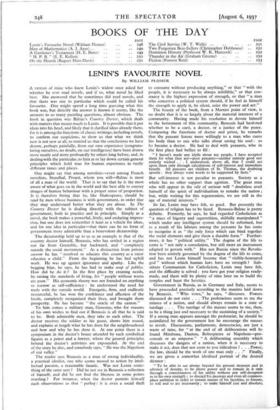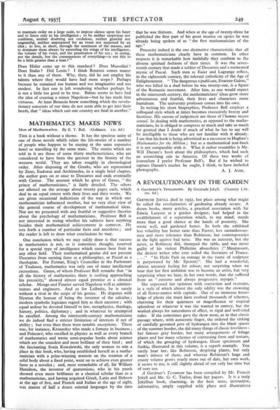BOOKS OF THE DAY
PAGE
PAGE
Lenin's Favourite Novel (William Plomer)
. . 248
The Civil Service (W. T. Wells) .. .. ..
251
Men of Mathematics (A. J. Ayer) ..
• •
.249
Two Forgotten Best-Sellers (Christopher Hobhouse)
251
A Gardener's Testament (H. E. Bates) . .
•• 249
Dominion History (Professor W. K. Hancock) ..
252
" H. P. B. " (E. E. Kellett) . .
. . 250
Thunder in the Air (Graham Greene) ..
252
On the Hearth (Rupert Hart-Davis)
. . 250
Fiction (Forrest Reid) . .
. :
253
LENIN'S FAVOURITE NOVEL
By WILLIAM PLOMER
A FRIEND of mine who knew Lenin's widow once asked her whether he ever read novels, and if so, what novel he liked best. She answered that he sometimes did read novels, and that there was one in particular which could be called his favourite. One might spend a long time guessing what this book was, but directly the answer is known it seems, like the answers to so many puzzling questions, almost obvious. The book in question was Balzac's Country Doctor, which deals with matters that meant much to Lenin. It is possible that it put ideas into his head, and likely that it clarified ideas already there, for it is among the functions of classic writings, including novels, to 'confirm our suspicions, to show us that what we think new is not new at all, to remind us that the conclusions we have drawn, perhaps painfully, from our own experience (congratu- lating ourselves, no doubt, on our intelligence) have been drawn more neatly and more profoundly by others long before, and, in dealing with the particular, to hint at or lay down certain general principles which hold true for human experience in vastly different times and places.
One might say that among novelists—even among French novelists, Stendhal, Proust, whom you will—Balzac is most of all a man of the world. That is to say that he is the most aware of what goes on in the world and the best able to convey images of human behaviour -with a proper sense of proportion. It is therefore fitting that he, like Shakespeare, should be read by men whose business is with government, in order that they may understand better what they are about. In The Country Doctor he is dealing directly with the subject of government, both in practice and in principle. Simply as a novel, the book makes a powerful, lively, and enduring impres- sion, but one does not remember it least as a vehicle for ideas, and for one idea in particular—that there can be no form of government more admirable than a benevolent dictatorship.
The dictatorship held up to us as an example is that of the country doctor himself, Benassis, who has settled in a region not far from Grenoble, but backward, and " completely outside the social movement." As a distraction from private sorrow he has " resolved to educate this country as a tutor educates a child." From the beginning he has had uphill work. He was up against ignorance and apathy. Like the begging friar, he says, he has had to make soup of pebbles. How did he do it ? In the first place by creating needs, by raising the standards of living, for " people without wants are poor." His economic theory was not founded on anything so narrow as self-sufficiency : he understood the need for trade with the outside world. Energetic, firm, and endlessly resourceful, he has won the confidence and affection of the locals, completely reorganised their lives, and brought them prosperity. He has become " the oracle of the canton."
To him comes a military- man, Genestas, who for reasons of his own wishes to find out if -Benassis is all that he is said to be. Both admirable men, they take to each other. The doctor receives the soldier as his guest, shows him round, and explains at length what he has done for the neighbourhood and how and why he has done it. At one point there is a symposium in the doctor's house attended by such symbolical figures as a priest and a lawyer, where the general principles behind the doctor's activities are expounded. At the end of the story he dies, and somebody says, " He was the Napoleon of our valley."
The reader sees Benassis as a man of strong individuality, a practical idealist, one who seems moved to action by intel- lectual passion, a reasonable fanatic. Was not Lenin some- thing of the same sort ? Did he not see in Benassis a reflection of himself, and did he not find the likeness in some points startling ? For instance, when the doctor permits himself such observations as that " perhaps it is even a social theft
to consume without producing anything," or that " with the people, it is necessary to be always infallible," or that con- stancy is the highest expression of strength, or that " a man who conceives a political system should, if he feel in himself the strength to apply it, be silent, seize the power and act." The beauty of the book, from a Marxist point of view, is no doubt that it is so largely about the material interests of a community. Having made his resolution to devote himself to the betterment of this community, Benassis had hesitated whether to be a cure, a doctor, or a justice of the peace. Comparing the functions of doctor and priest, he remarks that the peasant listens more willingly to a man who cures his body than to one who talks about saving his soul : so he became a doctor. He had to deal with peasants, who in the first place had bellies to fill :
" I haven't made any idylls about my people, I have accepted them for what they are—poor peasants—neither entirely good nor entirely wicked . . . I understood, above all, that I could act upon them only through calculations of self-interest and immediate benefit. All peasants are children of St. Thomas, the doubting apostle : they always want words to be supported by facts."
But self-interest is not peculiar to peasants. Society as a whole has no other support than egotism. The great man who will appear in the role of saviour will " doubtless avail _ himself of the spirit of individualism to remake the nation ;
but, while waiting for this regeneration, we are still in the age of material interests."
So far, Lenin may have felt, so good. But presently the question of religion has to be faced. Benassis-Balzac is pretty definite. Formerly, he says, he had regarded Catholicism as " a mass of bigotry and superstition, skilfully manipulated " which under any intelligent system should be reforined, but as a result of his labours among the peasants he has come to recognise it as " the only force which can bind together the social elements and give them a durable form." Further-
more, it has " political utility." The dogma of the life to come is " not only a consolation, but still more an instrument
adapted to govern with." Has not Russia since the Revolu- tion been entirely governed by the dogma of the life to come, and has not Lenin himself become that " visibly-honoured god " without which human laws have no strength ? Sub- stitute Communism for Catholicism, Lenin may have felt, and the difficulty is solved : you have got your religion ready- made, and there will be plenty of time later on to build the temples and hunt the heretics.
Government in Russia, as in Germany and Italy, seems to have proceeded precisely according to the maxims laid down by Benassis. " Who votes," he says, " discusses. Powers discussed do not exist . . . The proletarians seem to me the minors of a nation, and should always remain in a state of tutelage . . . The tutelage of the masses seems to me, then, to be a thing just and necessary to the sustaining of a society." If a strong man appears amongst the proletariat, he should be assimilated by the government lest he encourage the masses to revolt. Discussions, parliaments, democracies, are just a waste of time, for " at the end of all deliberations will be found Mirabeau, Danton, Robespierre or Napoleon—pro- consuls or an emperor." " A deliberating assembly which discusses the dangers of a nation, when it is necessary to make it act, does that not seem to you ridiculous ? . . . Power, the law, should be the work of one man only . . ." Finally, we are given a somewhat idealised portrait of the desired dictator ':
" To be able to see always beyond the present moment and in advance of destiny, to be above power and to remain in it only through a consciousness of his utility without any self-deception as to his own strength ; to discard his passions and even all common- place ambition in order to remain master of his faculties, to foresee, to will and to' act -incessantly ; to make hiniself just and absolute,
to maintain order on a large scale, to impose silence- upon his heart and to listen only to his intelligence ; to be neither suspicious nor confident, neither doubting nor credulous, neither grateful nor ungrateful, neither unprepared for an event nor surprised by an idea ; to live, in short, through the sentiment of the masses, and to dominate them always by extending the wings of his intelligence, the volume of his voice, and the penetration of his eye ; in seeing, not the details, but the consequences of everything—is not this to be a little greater than a man ? '
Does Hitler come up to this standard ? Does Mussolini ?
Does Stalin ) Did Lenin ? I think Benassis comes nearer to it than any of them. Why, then, did he not employ his
talents where they would have had more scope ? Perhaps because he remained too human and too imaginative and too modest. In fact one is left wondering whether perhaps he is not a little too good to be true. Balzac seems to have had the idea of creating a minor Napoleon—but he has made him virtuous. At least Benassis knew something which the revolu- tionary autocrats of our time do not seem able to get into their heads, that " ideas which suit one country are fatal in another."







































 Previous page
Previous page